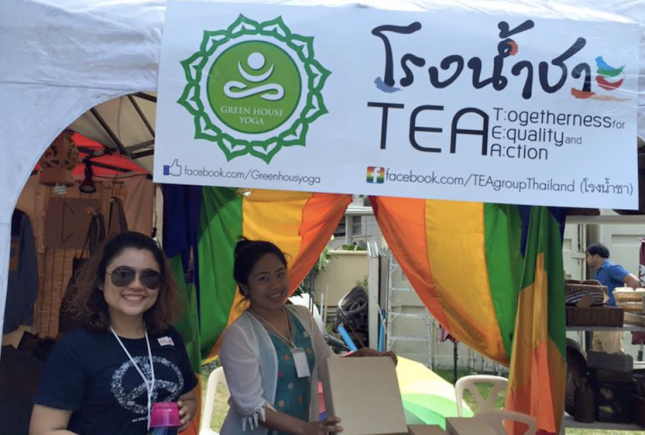This website uses cookies so that we can provide you with the best user experience possible. Cookie information is stored in your browser and performs functions such as recognising you when you return to our website and helping our team to understand which sections of the website you find most interesting and useful.
- WHERE
- Thailand
Togetherness for Equality and Action (TEA) is a lesbian, queer and bisexual women led group founded in 2013 and committed to building a sustainable and inclusive LBT movement in Thailand. They aim to cultivate and empower LBT youth activists from traditionally marginalized communities (low-income, rural, disabled, and from ethnic groups and religious minorities) through capacity-building trainings and curriculum development.
In the above video, Dao Chumaporn, one of TEA’s founders, discusses the organization’s work and what it’s meant to receive support from Astraea.
***
Video transcript:
We call our group TEA. TEA is meaning “tea house”, Togetherness for Equality and Action. And for in the term of Thai, we call rong n̂ả chā. It means a tea cafe in the south end of Thailand, allows only men to go to the tea cafe, coffee cafe, and talk about politics and social issues. When we call ourselves rong n̂ả chā, [which] a lot of people question about, I will say, but we want to touch on the gender, we want to touch on the barrier of the power of the male and female, power of the sexuality among Thai society.
When we started with TEA, we also had no idea what we were to do, what we were to do for LGBT people. We need a better world, but how can I do? What are the activities we choose to support Thai society? I question this kind of thing a lot. We cannot keep quiet anymore.
TEA started in 2013. My friend and I established this group because we felt that the young LBT people need the space to do something, or to plan something by themselves.
Astraea is open for us to decide the activity, and to decide how can I use the money for our community. Astraea supported us in 2005, [so] we could launch “Out of the Box” project with an Astraea grant. LGBT people need space to come out, and [the] “Out of the Box” project can help them go to the public or make safe space for them to come out.
TEA cannot work alone. “Work alone” means TEA cannot work and focus only on LGBT people. We are so focused on the intersectionality and on cross-cutting issues. We try to work with people in the rural areas, youth who work for the environment, Muslim communities, ethnic communities, and land rights. For me, I’m also interested in the LGBT refugees in Thailand. Even though in Thailand, [they] didn’t accept refugee commissions. But a lot of refugee and asylum seekers come to Thailand, and we found that some of them are LGBT people.
I think if we are human, if we should ask some kind of question to everyone: Should everyone go to the jails because we are different?



